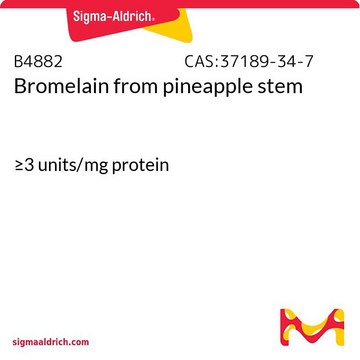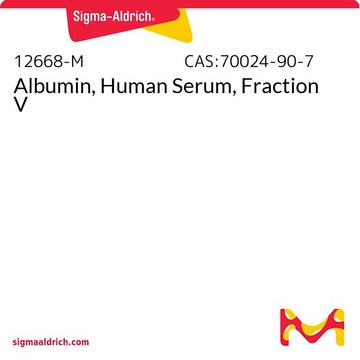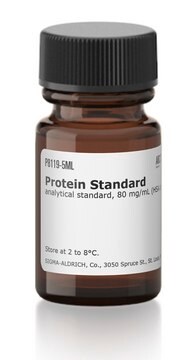A6784
Albumin solution human
10% in 0.85% sodium chloride and 0.05% sodium azide, aseptically filled
Synonym(s):
HSA
About This Item
Recommended Products
biological source
human
Quality Level
sterility
aseptically filled
form
liquid
concentration
10% in 0.85% sodium chloride and 0.05% sodium azide
9.5-11.4% protein (biuret)
technique(s)
ELISA: suitable
tissue culture: suitable
western blot: suitable
impurities
HIV I and HIVII, HCV and HBsAg, tested negative
UniProt accession no.
storage temp.
2-8°C
SMILES string
FC(F)(F)C(F)(F)C(F)(F)F
InChI
1S/C3F8/c4-1(5,2(6,7)8)3(9,10)11
InChI key
QYSGYZVSCZSLHT-UHFFFAOYSA-N
Gene Information
human ... ALB(213)
Looking for similar products? Visit Product Comparison Guide
General description
Application
Biochem/physiol Actions
Features and Benefits
- Easily crystallized and contain an excess of acidic amino acids.
- Serum and plasma albumin is carbohydrate-free and comprises 55-62% of the protein present
- Due to its high charge to mass ratio albumin binds water, Ca2+, Na+, K+, fatty acids, bilirubin, hormones, and drugs.
- The free hydrophobic region of fatty acid-free albumins helps to solubilize lipids in tissue culture
Other Notes
Disclaimer
Storage Class Code
10 - Combustible liquids
WGK
WGK 3
Flash Point(F)
Not applicable
Flash Point(C)
Not applicable
Choose from one of the most recent versions:
Certificates of Analysis (COA)
Don't see the Right Version?
If you require a particular version, you can look up a specific certificate by the Lot or Batch number.
Already Own This Product?
Find documentation for the products that you have recently purchased in the Document Library.
Customers Also Viewed
Our team of scientists has experience in all areas of research including Life Science, Material Science, Chemical Synthesis, Chromatography, Analytical and many others.
Contact Technical Service





